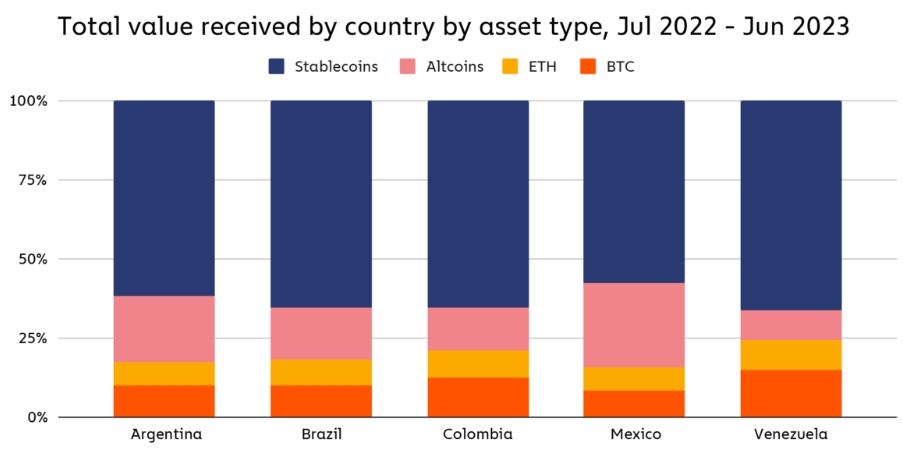News - How censorship-resistant Tether really is
By
How censorship-resistant Tether really is
Money laundering, sanctions evasion and terrorist financing with USDT - the list of accusations is long. But in reality, Tether stablecoin has a different problem.
Just a few days ago circulated there were reports that state oil company Petróleos de Venezuela wanted to use USDT to circumvent sanctions. The easing of the U.S. embargo against Venezuela had previously expired, leaving the Maduro regime looking for new options for the financial management of its oil exports. The stablecoin issuer defended itself against the accusations - USDT wallets for circumventing Venezuelan sanctions would be immediately be frozen. Recently, the Wall Street Journal Tether also of helping to circumvent Russian sanctions. The accusations are harsh. But is USDT fit for such sensitive purposes?
Source: Chainalysis
With a current market capitalization of more than USD 110 billion, USDT is by far the largest stable dollarcoin. In an interview with the German BTC-ECHO explained Tether CEO Paolo Ardoino that USDT's connection to illegal transactions is simply a symptom of its success. He has a point, as according to a UN report criminals like to use Tether stablecoin because it allows fast and cheap transactions with low volatility. According to Ardoino, Tether also cooperates with dozens of law enforcement agencies. An internal investigation team has already frozen $1.2 billion in illegal money.
USDT users are at the mercy of Tether
In fact, the publisher of stablecoins willingly cooperates with the justice system. In December, for example, Tether froze wallets with more than USD 435 million in assets to support U.S. law enforcement agencies. At that occasion announced Ardoino to that his company wanted to become a "world-class partner" of the U.S. to "extend the hegemony of the dollar globally." The strict "wallet-freezing policy" can be expressed in numbers: according to dune there are now 1428 USDT addresses blocked with more than a billion dollars in balances. If criminals are really being targeted, the approach is understandable, but there can be no censorship resistance with the centralized USDT stablecoin - any wallet can be blocked at any time by state authorities.
This means that wallets can also be blocked if they are used by political dissidents or unpopular NGOs. The only condition is that state actors target them and Tether gives in to pressure from the authorities. "Almost our entire user base is in emerging markets." said Adoino proudly spoke at the Token2049 conference last week. And indeed, more and more people in Argentina, Vietnam and Turkey are using USDT to save money.
But what if a U.S. government finds reasons to impose sanctions on these countries in the future? Or if the respective governments themselves want to take action against opposition organizations? In such cases, USDT users are ultimately at the mercy of Tether. If you really want to protect yourself from financial repression, the answer is not USDT, but Bitcoin.







